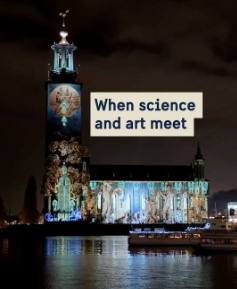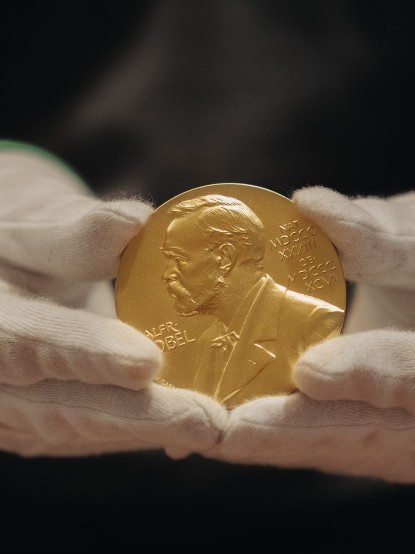The Swedish Nobel Prize
Great minds think differently. The Nobel Prize is a celebration of excellence.
To many, the Nobel Prize is the most prestigious award in the world in its field. In accordance with Alfred Nobel's will, the prize celebrates ‘those who, during the preceding year, shall have conferred the greatest benefit on mankind’.
Prizes in physics, chemistry, physiology or medicine, literature and peace exist since 1901.
Later, in 1968, Sweden’s central bank (Sveriges Riksbank) established the Prize in Economic Sciences in Memory of Alfred Nobel via a donation to the Nobel Foundation. Since then, the Royal Swedish Academy of Sciences awards the prize, basing selections on the same principles as the Nobel Prizes.
Prize-winning discoveries include X-rays, radioactivity and penicillin. Peace laureates include Nelson Mandela and the 14th Dalai Lama. Winners in literature have thrilled readers with works such as One Hundred Years of Solitude (Gabriel García Márquez) and The Grass is Singing (Doris Lessing).
Nobel Prize winners announced in October
Every year in early October, the winners are announced. Then on 10 December, the so-called Nobel Day, award ceremonies take place in the Swedish capital of Stockholm and the Norwegian capital of Oslo.
But the Nobel Week includes more than award ceremonies – among other things, the Nobel Prize laureates give lectures at different institutions around the city and there's an outdoor light festival, Nobel Week Lights.
Nobel Center – in the making
The Nobel Center – a public building for science, literature, and peace – will be built at Slussen in Stockholm. Designed by David Chipperfield Architects, construction is scheduled to begin in 2027, with an opening planned for 2031.
Some winner statistics
Between 1901 and 2024, the Nobel Prize and prize in economic sciences have been awarded to women 66 times. One woman, Marie Curie, is a two-time recipient – she won the 1903 award in physics and the 1911 award in chemistry.
In 1909, Swede Selma Lagerlöf became the first female literature laureate.
The oldest winner to date is John B. Goodenough (1922–2023), who was 97 when he received the Prize in Chemistry in 2019.
The youngest winner to date is Malala Yousafzai, who was 17 when she received the Peace Prize in 2014.
Four winners have been forced to decline the prize: Germans Richard Kuhn (Chemistry), Adolf Butenandt (Chemistry) and Gerhard Domagk (Physiology/Medicine) were forbidden by Adolf Hitler from accepting their prizes. Russian Boris Pasternak initially accepted the 1958 award in literature, but was later coerced into declining by Soviet authorities.
The three Germans later received their awards, but not the prize money.
Two winners have declined
Jean-Paul Sartre declined the 1964 Literature Prize because he had consistently declined all official honours.
In 1973, Lê Ðức Thọ and US Secretary of State Henry Kissinger were awarded the Peace Prize for negotiating the Vietnam peace agreement. But Lê Ðức Thọ declined the award, saying he could not accept the prize due to the situation in Vietnam.
The man behind the prize
The Nobel Prize is the legacy of Alfred Nobel, a chemist, engineer, inventor and entrepreneur. Nobel was born on 21 October 1833 in Stockholm, Sweden, and died on 10 December 1896 in San Remo, Italy.
When he signed his last will in 1895, Nobel declared that he wanted the bulk of his assets to go to a fund, and that the interest from that fund should be distributed as annual prizes.
Nobel’s own inventions include a blasting cap, dynamite and smokeless gunpowder. He became world-famous when the St. Gotthard Tunnel in the Swiss Alps was completed in 1881 and dynamite was used for the first time on a large scale.
When he died, Nobel held 355 patents in different countries. There were Nobel companies in more than 20 countries, with explosives of all kinds being manufactured under his patents in around 90 factories worldwide. Nobel lived and worked in many countries, including Sweden, Russia, France, the UK, Germany and Italy.
The foundation
In 1900, the four institutions awarding the prizes agreed to create the Nobel Foundation, a private institution based on the will of Alfred Nobel.
Since then, the foundation has administered Alfred Nobel’s assets, as well as organised the public announcements and arranged the prize ceremonies.
When the foundation was created, Alfred Nobel's capital totalled around SEK 31 million – quite a sum of money at the time. Today, the founation is worth around SEK 5 billion.
The Royal Swedish Academy of Sciences awards the prizes in physics and chemistry, as well as economics.
The Swedish Academy awards the Literature Prize.
The Nobel Assembly at Karolinska Institutet awards the Nobel Prize in Physiology or Medicine.
The Norwegian Nobel Committee awards the Peace Prize. The committee consists of five members who have been apppointed by the Norwegian parliament.
Each category is currently worth SEK 11 million. There can be up to three recipients for each prize, who share the sum between them.
The Nobel Banquet
It is tradition that the Nobel Prize award ceremonies on 10 December are followed by a Nobel Banquet. Stockholm City Hall hosts the banquet, and some 1,300 guests are invited.
A timeline of culture and science
From the first award in 1901 to the most recent ones in 2023, Nobel Prizes have been awarded 621 times. A total of 965 individuals and 27 organisations have been awarded, with some receiving the Nobel Prize more than once.
1901: Wilhelm Conrad Röntgen receives the first Nobel Prize in Physics for his discovery of X-rays.
1903: Marie Curie becomes the first female laureate, as the joint winner in physics for her research into radioactivity. Eight years later, in 1911, Curie receives the Nobel Prize in Chemistry for her discovery of radium.
1905: Austrian baroness and author Bertha von Suttner becomes the first woman to win the Nobel Peace Prize, in recognition of her work with the pacifist movements in Germany and Austria. Von Suttner also knew Alfred Nobel personally and is widely credited as the person who inspired him to create the Peace Prize.
1912: Swedish inventor and industrialist Gustaf Dalén wins the Nobel Prize in Physics for his contributions to lighthouse technology. He invented the AGA lighthouse, a type of automatic lighthouse that ran on acetylene gas. It made it possible to reduce gas consumption by 90 per cent compared with earlier constructions.
1914–1918: In the wake of World War I, only one Peace Prize is awarded. The International Committee of the Red Cross receives it in 1917, 'for the efforts to take care of wounded soldiers and prisoners of war and their families'. The International Committee of the Red Cross will go on to receive the Nobel Peace Prize twice more, in 1944, and jointly with the League of Red Cross Societies in 1963.
1922: Albert Einstein receives the Nobel Prize in Physics – for 1921, technically. The Nobel Committee for Physics' decision to give Einstein the award a year later is shortly explained here. Einstein is awarded '...for his services to Theoretical Physics, and especially for his discovery of the law of the photoelectric effect'.
1945: Sir Alexander Fleming, Ernst Boris Chain and Sir Howard Walter jointly receive the Nobel Prize in Physiology or Medicine Florey for the discovery of penicillin.
1952: Selman Abraham Waksman receives the Nobel Prize in Physiology or Medicine, for his discovery of streptomycin – the first antibiotic effective against tuberculosis.
1968: The Prize in Economic Sciences in Memory of Alfred Nobel is introduced as a Nobel Prize category.
1975: David Baltimore, Renato Dulbecco and Howard Martin Temin jointly receive the Nobel Prize in Physiology or Medicine 'for their discoveries concerning the interaction between tumour viruses and the genetic material of the cell'.
1983: American Barbara McClintock receives the Nobel Prize in Physiology or Medicine for her discovery of mobile genetic elements.
1993: Toni Morrison receives the Nobel Prize in Literature. Her novels are '...characterized by visionary force and poetic import, (giving) life to an essential aspect of American reality', writes the Swedish Academy.
2004: Aaron Ciechanover, Avram Hershko and Irwin Rose jointly receive the Nobel Prize in Chemistry for the discovery of ubiquitin-mediated protein degradation.
2010: Robert G. Edwards of the United Kingdom receives the Nobel Prize in Physiology or Medicine for the development of in vitro fertilization.
2011: Swedish poet Tomas Tranströmer receives the Nobel Prize in Literature. 'Because, through his condensed, translucent images, he gives us fresh access to reality', writes the Swedish Academy.
2018: In the midst of a crisis, the Swedish Academy chooses not to hand out a literature prize. The Academy cites its diminished number of active members and a reduced public confidence as the reasons. The year after, the Academy announces the Nobel Prize in Literature for 2018 – Olga Tokarczuk – in parallel with the naming of the 2019 Laureate, Peter Handke.
2019: Ethiopian prime minister Abiy Ahmed Ali receives the Nobel Peace Prize for his efforts to resolve border conflicts between Ethiopia and neighbouring country Eritrea. The intent of the Prize is also to recognise all stakeholders working for peace and reconciliation in Ethiopia and in the East and Northeast African regions.
Previous Nobel Peace Prize Laureates include Martin Luther King (1964), Mother Teresa (1979) and Barack Obama (2009).
2022: Swede Svante Pääbo receives the Nobel Prize in Physiology or Medicine 'for his discoveries concerning the genomes of extinct hominins and human evolution'.
2023: French-Swedish Anne L'Huillier – professor at Lund University – receives the Nobel Prize in Physics together with Pierre Agostini and Ferenc Krausz 'for experimental methods that generate attosecond pulses of light for the study of electron dynamics in matter'.
2025 winners (countries denote place of birth)
Physiology or Medicine
Mary E. Brunkow (United States), Fred Ramsdell (United States) and Shimon Shakaguchi (Japan): ‘For their discoveries concerning peripheral immune tolerance.’
Physics
John Clarke (England), Michel H. Devoret (France) and John M. Martinis (United States): ‘For the discovery of macroscopic quantum mechanical tunnelling and energy quantisation in an electric circuit.’
Chemistry
Susumu Kitagawa (Japan), Richard Robson (England) and Omar M. Yaghi (Jordan): ‘For the development of metal-organic frameworks.’
Literature
László Krasznahorkai (Hungary): ‘For his compelling and visionary oeuvre that, in the midst of apocalyptic terror, reaffirms the power of art.’
Nobel Peace Prize
Maria Corina Machado (Venezuela) : ‘For her tireless work promoting democratic rights for the people of Venezuela and for her struggle to achieve a just and peaceful transition from dictatorship to democracy.’
The Sveriges Riksbank Prize in Economic Sciences in Memory of Alfred Nobel
Joel Mokyr (Netherlands): ‘For having identified the prerequisites for sustained growth through technological progress.’
and
Philippe Aghion (France) and Peter Howitt (Canada): ‘For the theory of sustained growth through creative destruction.’


